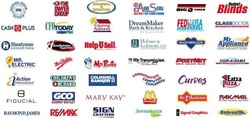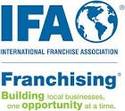Business Ownership
Boomer Entrepreneurship

Changing jobs or laid off...so you're seriously contemplating starting your dream business.
Lay-offs and the desire to do something new have no age boundaries, and certainly if you're now in the position to own that business you've always dreamed of, your age and experience are huge assets!
In fact, the 2011 Kauffman Index of Entrepreneurial Activity found that the percentage of businesses created by those ages 55 to 64 grew more than any other age group, up 6.6 percent to 20.9 percent in 2011 vs. 14.3 percent in 1996.
According to Kauffman, "To increase their odds as founders, baby boomers must carefully consider financing options, establish comfort with social media, and embrace intergenerational thinking in their business ventures. They also are advised to research various firm options, among them true startups, franchises and takeovers of established firms."
That said, the biggest - and most costly - mistake Boomer new business owners make is putting all their capital into the hard items, such as advertising & materials, and none into their own transition to business ownership, unwittingly undermining their own efforts. This is the fastest way to turn personal/professional strengths into liabilities.
When it comes to owning your own business after decades of working for someone else, you no doubt have all the industry related skills you need, but must learn how to be a true entrepreneur, not someone with a JOB that happens to be his/her own boss.... The former is the key to business success; the latter is why so many new businesses fail.
Here are just a few of the skills that must be permanently heightened for any Boomer's new business to get to great! (read "business at its most productive"):
Prepare yourself to successfully handle the major transition from employee to owner
Yes - you love what you do and you do it well - this is why you started your own business in the first place, right?
But now as a business owner, you're the "chief cook and bottle washer" besides being the expert in your particular field. You need to wear all the hats, and wear them well, from HR, to Marketing and Administrative. And most importantly, you must start thinking like an owner, not an employee. Many new businesses fail because the owner took too long to acclimate to this whole new world, and by the time s/he did, the capital ran out. Don't let this happen to you.
Learn the techniques/embrace the proven tools for using your time effectively
Now, more than ever, it's imperative that you waste not a moment, whether it's needing to repeat things that you didn't get right the first time or putting your energies into items and people that are out of alignment with your business development goals. Effectively managing your time and efforts as a business owner has differences from doing so as an employee. We'll show you those differences and give you techniques to use immediately.
Research/Learn from the pros, the pitfalls, and best practices, of business ownership
To get this started for you, listen to Entrepreneur Coach and Consultant to numerous Fortune 500 companies, Rick Anthony, Founder & CEO of The SolutionsNetwork, Inc., in 2 of his expert features on Terri's show:
Lay-offs and the desire to do something new have no age boundaries, and certainly if you're now in the position to own that business you've always dreamed of, your age and experience are huge assets!
In fact, the 2011 Kauffman Index of Entrepreneurial Activity found that the percentage of businesses created by those ages 55 to 64 grew more than any other age group, up 6.6 percent to 20.9 percent in 2011 vs. 14.3 percent in 1996.
According to Kauffman, "To increase their odds as founders, baby boomers must carefully consider financing options, establish comfort with social media, and embrace intergenerational thinking in their business ventures. They also are advised to research various firm options, among them true startups, franchises and takeovers of established firms."
That said, the biggest - and most costly - mistake Boomer new business owners make is putting all their capital into the hard items, such as advertising & materials, and none into their own transition to business ownership, unwittingly undermining their own efforts. This is the fastest way to turn personal/professional strengths into liabilities.
When it comes to owning your own business after decades of working for someone else, you no doubt have all the industry related skills you need, but must learn how to be a true entrepreneur, not someone with a JOB that happens to be his/her own boss.... The former is the key to business success; the latter is why so many new businesses fail.
Here are just a few of the skills that must be permanently heightened for any Boomer's new business to get to great! (read "business at its most productive"):
Prepare yourself to successfully handle the major transition from employee to owner
Yes - you love what you do and you do it well - this is why you started your own business in the first place, right?
But now as a business owner, you're the "chief cook and bottle washer" besides being the expert in your particular field. You need to wear all the hats, and wear them well, from HR, to Marketing and Administrative. And most importantly, you must start thinking like an owner, not an employee. Many new businesses fail because the owner took too long to acclimate to this whole new world, and by the time s/he did, the capital ran out. Don't let this happen to you.
Learn the techniques/embrace the proven tools for using your time effectively
Now, more than ever, it's imperative that you waste not a moment, whether it's needing to repeat things that you didn't get right the first time or putting your energies into items and people that are out of alignment with your business development goals. Effectively managing your time and efforts as a business owner has differences from doing so as an employee. We'll show you those differences and give you techniques to use immediately.
Research/Learn from the pros, the pitfalls, and best practices, of business ownership
To get this started for you, listen to Entrepreneur Coach and Consultant to numerous Fortune 500 companies, Rick Anthony, Founder & CEO of The SolutionsNetwork, Inc., in 2 of his expert features on Terri's show:
~~~~~~~~~~~~~~~~~~~~~~~~~~~~~~~~~~~~~~~
More advice on starting your own business

BoomerNextStep is particularly useful for those interested in starting a work from home or family-owned business, but they also have resources for all types of start-ups.
~~~~~~

StartupNation is a free service founded by entrepreneurs for entrepreneurs, created as a one-stop shop for entrepreneurial success, providing "real world tips and practical advice for aspiring and existing business owners.".
~~~~~~

You may have already heard of SCORE (Service Corp of Retired Executives), a nonprofit association of volunteers "dedicated to helping small businesses get off the ground, grow and achieve their goals through education and mentorship." This includes business tools & start-up templates, as well as free and/or low-cost workshops and webinars. SCORE is an excellent place for Boomers to get help from fellow Boomers.
Help for Boomers interested in franchises
Advice from Huffington Post Small Business

For those executive-level Boomers who have been out of work for a long-time, it's becoming painfully clear that good high-level jobs are hard to find.
So, as we all take stock at the start of a new year, lots of very frustrated downsized executives are looking at the real possibility of ditching the job search altogether, and instead starting their own business. And one increasingly popular option for business ownership is going franchise.
But, is becoming the owner of a franchise business a good idea?
It certainly can be. That's because there's quite a few benefits to becoming the owner of a franchise vs. doing it on your own:
The model is already developed and tested: The franchise business model provides a proven formula for people that are interested in starting their own business. The cost of entry to use this formula is an upfront franchise fee. Once the business is up and running, franchisees pay royalties (usually a percentage of gross sales) for the continued use of the formula.
An operating system is already in place: Also known as the blueprint, this includes the franchisors operations manual that details everything a franchisee needs to know to start the business. It includes guidelines that franchisees need to follow in areas like equipment, inventory, design, branding, marketing, customer service, accounting and more.
A formal training program is included: Franchise training programs are generally top-notch, and include just about everything that franchisees need to know about opening, operating, and growing a successful franchise business.
Group purchasing power is another come-with: Franchisees of medium to large franchise systems can take advantage of the franchise's size. For example, a 200-unit franchise chain can purchase supplies that all franchisees need much cheaper than a single franchisee ever could. This buying power translates into a competitive advantage at the local level, too; franchisees can pass on their savings to their customers, while at the same time, attract new ones.
Brand recognition: A franchise system that has attained "brand status" can be pretty powerful thing. It can provide a real path to serious market share, while at the same time help franchisees increase the value of their individual businesses.
Support: Franchisors provide support to their franchisees in several ways during various times in the business cycle. Things like pre-launch support at the beginning to field visits throughout their time as franchisees are usually just part of what franchisees receive in terms of support from the franchisor.
Uniformity: Every franchisee needs to adhere to the operating procedures and rules that are spelled out in both the operations manual and their franchise agreements, so you won't have to make up the rules of the business yourself, it's already done for you.
The most obvious down-side is cost. You'll need a fairly large nest egg since owning a franchise is not inexpensive. And, just like any new business, start-up franchises don't typically make money for a while, so this may not be the best choice for people that need an immediate income. Locating an existing franchise that's been in business for awhile with revenue already coming in could work out better.
So, as we all take stock at the start of a new year, lots of very frustrated downsized executives are looking at the real possibility of ditching the job search altogether, and instead starting their own business. And one increasingly popular option for business ownership is going franchise.
But, is becoming the owner of a franchise business a good idea?
It certainly can be. That's because there's quite a few benefits to becoming the owner of a franchise vs. doing it on your own:
The model is already developed and tested: The franchise business model provides a proven formula for people that are interested in starting their own business. The cost of entry to use this formula is an upfront franchise fee. Once the business is up and running, franchisees pay royalties (usually a percentage of gross sales) for the continued use of the formula.
An operating system is already in place: Also known as the blueprint, this includes the franchisors operations manual that details everything a franchisee needs to know to start the business. It includes guidelines that franchisees need to follow in areas like equipment, inventory, design, branding, marketing, customer service, accounting and more.
A formal training program is included: Franchise training programs are generally top-notch, and include just about everything that franchisees need to know about opening, operating, and growing a successful franchise business.
Group purchasing power is another come-with: Franchisees of medium to large franchise systems can take advantage of the franchise's size. For example, a 200-unit franchise chain can purchase supplies that all franchisees need much cheaper than a single franchisee ever could. This buying power translates into a competitive advantage at the local level, too; franchisees can pass on their savings to their customers, while at the same time, attract new ones.
Brand recognition: A franchise system that has attained "brand status" can be pretty powerful thing. It can provide a real path to serious market share, while at the same time help franchisees increase the value of their individual businesses.
Support: Franchisors provide support to their franchisees in several ways during various times in the business cycle. Things like pre-launch support at the beginning to field visits throughout their time as franchisees are usually just part of what franchisees receive in terms of support from the franchisor.
Uniformity: Every franchisee needs to adhere to the operating procedures and rules that are spelled out in both the operations manual and their franchise agreements, so you won't have to make up the rules of the business yourself, it's already done for you.
The most obvious down-side is cost. You'll need a fairly large nest egg since owning a franchise is not inexpensive. And, just like any new business, start-up franchises don't typically make money for a while, so this may not be the best choice for people that need an immediate income. Locating an existing franchise that's been in business for awhile with revenue already coming in could work out better.
~~~~~~~~~~~~~~~~~~~~~~~~~~~~~~~~~~~~~~~
Entrepreneur Magazine's Top 10 Large Investment Franchises for 2018
|
...and Their Top 10 Affordable Ones
|
~~~~~~
I recommend these franchising assistance sites:

This free internet franchise info/locator site provides franchise opportunities and a business directory for prospective entrepreneurs. Info on hundreds of franchise opportunities and businesses for sale. Franchise Gator has been tried and true for 10 years and counting, with the tools to discover the right business for you, including a selector tool & the filters to narrow your search.
~~~~~~

The International Franchise Association is the world’s oldest and largest organization representing franchising worldwide, providing franchise education and advocacy for over 50 years. IFA’s mission is to protect, enhance and promote franchising through government relations, public relations and educational programs.
~~~~~~

The US Small Business Administration's Franchising Assistance puts your tax dollars to work with sound advice & tools for determining if franchising is right for you, including a link to the FTC’s Bureau of Consumer Protection which also has a wide range of resources and guides to help you buy a franchise, and avoid franchise mistakes.

